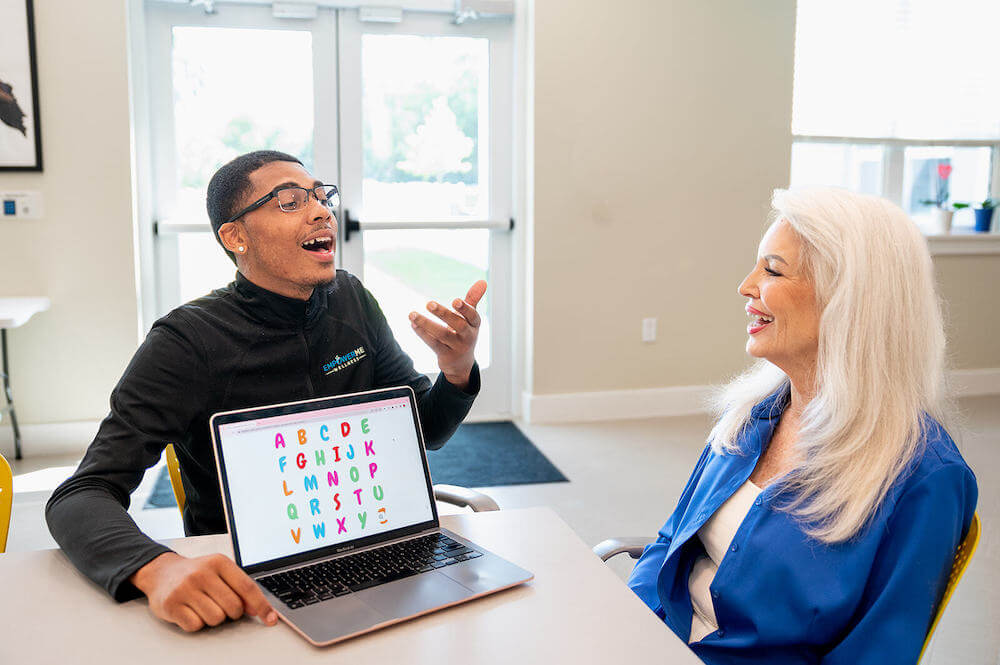Table of contents
More Than Words: The Role of Speech Therapy in Senior Rehab
Enhancing Senior Communication with Speech-Language Pathology
As we age, changes in our bodies and brains can impact our ability to communicate effectively. For seniors, this can lead to feelings of isolation, frustration, and even depression. Speech-language pathology, or SLP, can be a valuable tool for seniors experiencing difficulties with communication. Through various exercises and techniques, speech-language pathology, also known as “speech therapy,” helps seniors improve speech, language, swallowing, and cognitive skills, which can enhance their overall quality of life.
"I think the biggest misconception is that SLPs just "help people talk". Our Services are much broader than that. We treat individuals across their entire lifespan and address skills such as speaking, thinking, understanding, reading, writing, and even chewing and swallowing."
What Is Speech-Language Pathology?
Speech-language pathology services focus on the evaluation and treatment of speech, language, and cognitive communication disorders, as well as dysphagia (swallowing disorders). Seniors may benefit from SLP services after having been diagnosed with a stroke, brain injury, dementia, Parkinson’s disease, amyotrophic lateral sclerosis (ALS), multiple sclerosis, vocal cord injury, breathing problems, or other issues which affect speech, language, cognition, communication, or swallowing.
Specific techniques and treatment interventions used in speech-language pathology depend on the plan of care developed for each individual. Interventions may include tasks and exercises to improve, maintain, train, and retrain speech / language / cognitive / memory skills, swallowing skills, and overall communication skills. These include verbal or non-verbal strategies so the individual can communicate and function as effectively as possible with daily activities. SLPs may also develop compensatory strategies to assist the patient with cognitive-communication skills, speech, and swallowing.
Individualized Treatment
SLPs begin with the individual’s clinical history and conduct a comprehensive evaluation with the individual to determine functional deficits, areas of impairment, and areas of strength. They then work with the individual to determine their personal goals for therapy. From there, the SLP determines the most effective interventions to help the individual achieve their goals.
The length and format of a speech-language pathology session depend on the plan of care developed for the individual based on their needs and goals; a typical session may last between 30 minutes to an hour. Depending on the plan of care, activities may include oral motor exercises to improve articulation, instruction, and education on compensatory speech strategies to improve speech intelligibility, memory strategies, activities focused on problem-solving skills, and maximizing safety in the individual’s home environment. Each treatment session will hone in on the specific skills needed to help the individual meet their goals.
Next Steps
Once speech-language pathology services are completed, the individual should continue to improve their speech on their own. For example, if a treatment plan is focused on speech intelligibility, the individual should continue performing their oral motor exercises to improve muscle strength, coordination, and range of motion. They should also continue to utilize their compensatory speech strategies when speaking. For any EmpowerMe Wellness treatment programs, the SLP will provide the individual with exercises, activities, and techniques to continue building the skills focused on during their treatment.
By improving their speech, language, and cognitive skills, seniors can enhance their overall quality of life and maintain their independence. Speech therapy can also help seniors stay connected with loved ones, participate in social activities, and engage in their communities. If you or a loved one are experiencing communication difficulties, it’s important to seek help from a qualified speech-language pathologist. With the proper support and guidance, seniors can improve their communication skills and continue to lead fulfilling lives.
In Conclusion
To begin speech-language pathology sessions, ask your physician for recommendations. If you are a resident of a senior living community with an EmpowerMe therapy team on site, let a therapy team member know you are interested, and we will set up your first appointment to evaluate your needs and personalized goals.
To learn more about SLP programs at EmpowerMe, contact us here or read about our therapy services here.



